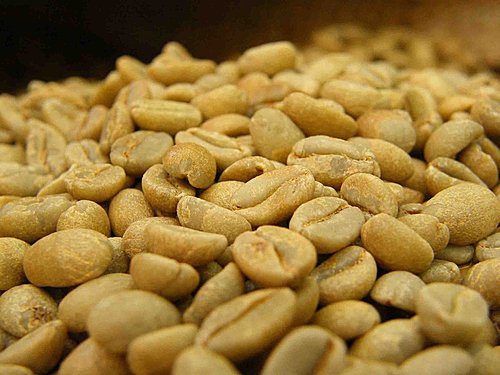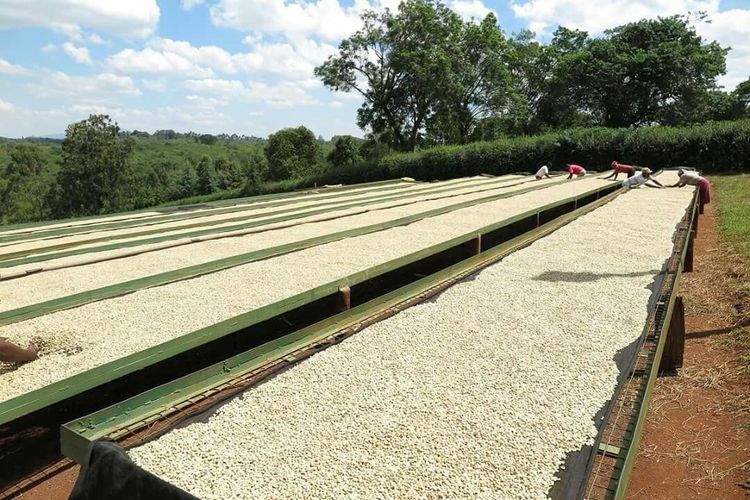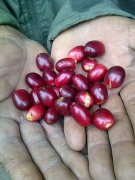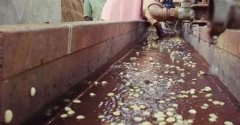Black Crystal Farm of Tanzania details the special sack coffee in Tanzania.
For professional baristas, please follow the coffee workshop (Wechat official account qianjiecoffee)

This is a kind of rough fiber made from tequila leaves, similar to jute bags, which are banned by the local government to protect the sisal industry in Tanzania, while sacks made of sisal do not have the special earthy smell of jute bags.
Coffee is called Kahawa kahawa in Tanzania, although it is not as famous as Kenya in the coffee industry, but its annual output is almost the same as that of Kenya. It is mainly sold through competitive bidding and direct sales. The earliest Arabica seeds were introduced from R é union French island of Reunion and planted in the two producing areas of Bayamoyo and Mogoro. In 1893, beans planted on the slopes of Kilimanjaro became the most successful coffee beans. Other varieties were also introduced from neighboring Polondi in the 1950s. The species is found in western Tanzania and is currently mainly grown at high elevations. However, wild coffee trees continue to emerge, recently found in Coffea kihansiensis in the Udzungwa Mountains.
The main producing areas are: Mara, Kilimazaro, Rovuma, Mbeya, Kighoma, Arusha, Manyala, Bukoba and Kagera. Arabica beans account for nearly 75% of Tanzania's annual output, and Tanzania produces 50,000 tons of coffee a year.

Direct Coffee introduced cloud beans from Clouds of August in August, the best black crystal estate in Blackburn Estate, Tanzania, in 2011. Its owner, Michael, was born in Germany and has been growing coffee for more than 20 years. Michael fell in love with this place when he first visited East Africa in 1971. In 1983, he moved to Tanzania for a long time and reorganized his parents' farm. At that time, the coffee trees of Blackburn Estate Black Crystal Manor were almost flooded by other trees. And a whole group of baboons live in their house! It was not until Tanzania opened up its market in the late 1980s that Micahel began to study growing coffee. Black Crystal Manor is now an award-winning manor, not only because of the unique flavor of coffee, but also because of Michael's investment in the ecological conservation of the manor, the use of pesticides in the manor is organically grown coffee, and 80% of the land in the garden is planned for natural conservation. Wild animals are leisurely here, unfettered by fences-lions, buffaloes, elephants, cheetahs and a variety of other species travel through coffee trees and vast forests at night.
Coffee is grown at an altitude of about 1760-1950 meters. The actual coffee-growing area accounts for only 16% (about 187 acres) of the entire estate, and the large shade of native trees also provides the most sun-exposed shade, so there have recently been new coffee-growing areas to the east and south of the estate. in the future, these producing areas will mainly provide special hand-selected small batches of beans. Black Crystal Manor has a well-managed washing plant, which is fed by the high mountain springs of Oldeani Odini (which means bamboo shoot mountain in the local language), and all the coffee is dried on elevated scaffolding (so-called African elevated beds). After drying, the coffee from the manor is sent to the drying plant in Moshi and packed in a sack every 60 kilograms, a rough fiber made from tequila leaves, similar to jute bags, which are banned by the local government to protect the sisal industry in Tanzania, while sacks made of sisal do not have the special earthy smell of jute bags.

Property Characteristics: farm characteristics
Farm Farm name: Blackburn Estate Black Crystal Manor
Owner Farm owner: Michael Gehrken
Region producing area: West of Oldeani (Karatu District) west of Odini Mountain (Karatu area)
Country countries: Tanzania Tanzania
Altitude altitude: 1760-1900 m
Farm Size Farm area: 1124 acres acres
Coffee area coffee acreage: 187 acres acres
Rainfall annual rainfall: 870mm mm
Certification Certification: organic Organic
Shade Trees shade tree species: native trees
Water Source Water Source: the Alpine Spring of Oldeani Odini Mountain (the local language means Bamboo shoot Mountain)

Coffee Characteristics: coffee characteristics
Coffee Coffee name: Blackburn Estate Clouds of August Black Crystal Manor Clouds of August August Cloud
Variety varieties: Kent, Bourbon Kent, bourbon
Processing System treatment: Wet Process, African raised beds Water treatment African (Solar) elevated bed drying
Flowering period flowering period: September-October September to October
Harvest period harvest time: March-July March to July
Appearance appearance: 17 mesh
Important Notice :
前街咖啡 FrontStreet Coffee has moved to new addredd:
FrontStreet Coffee Address: 315,Donghua East Road,GuangZhou
Tel:020 38364473
- Prev

Introduction to the flavor and taste of coffee beans described by the characteristics of Kenya Xinya Muiri farm
For the exchange of professional baristas, please follow the coffee workshop (Wechat official account qianjiecoffee) Kenya Muiri farm Kenya is a model country for producing fine coffee beans. Coffee was introduced from Britain in 1900. only traditional Arabica did not have the best bourbon species of SL28 and SL34 in Kenya until 1950, all of which were collected and treated.
- Next

Detailed introduction of Musasa Cooperative of Gatta Guana processing Station of Musasha Group in Rwanda
For professional baristas, please follow the coffee workshop (Wechat official account qianjiecoffee) Rwanda is famous for its "Land of Thousand Hills" and the biographical film "Land of Gorillas in the Mist". The country is less than half the size of Scotland, but it has more than 3 million residents and is a landlocked part of East Africa.
Related
- Does Rose Summer choose Blue, Green or Red? Detailed explanation of Rose Summer Coffee plots and Classification in Panamanian Jade Manor
- What is the difference between the origin, producing area, processing plant, cooperative and manor of coffee beans?
- How fine does the espresso powder fit? how to grind the espresso?
- Sca coffee roasting degree color card coffee roasting degree 8 roasting color values what do you mean?
- The practice of lattes: how to make lattes at home
- Introduction to Indonesian Fine Coffee beans-- Java Coffee producing area of Indonesian Arabica Coffee
- How much will the flavor of light and medium roasted rose summer be expressed? What baking level is rose summer suitable for?
- Introduction to the characteristics of washing, sun-drying or wet-planing coffee commonly used in Mantenin, Indonesia
- Price characteristics of Arabica Coffee Bean Starbucks introduction to Manning Coffee Bean Taste producing area Variety Manor
- What is the authentic Yega flavor? What are the flavor characteristics of the really excellent Yejasuffi coffee beans?

